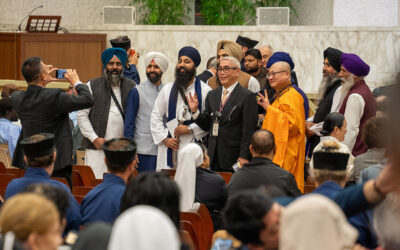Simplicity and professionalism are evident in the elegant but simple Great Hall of the Rome base of the American University of Notre Dame du Lac. Here on 27th January Cardinal Jean-Louis Tauran, the President of the Pontifical Council for Interreligious Dialogue, and Maria Voce, President of the Focolare Movement, received honorary Doctorates in Law.
The American scholar Thomas G. Burish, Vice Chancellor of the prestigious university, opened the ceremony. He emphasized that honorary degrees are conferred on those who have given a contribution never seen before.

The President of the University, The Revd John Jenkins, giving the honorary degree to Maria Voce. Photo © University of Notre Dame
Caridinal Tauran and Maria Voce, in their respective fields, offer something unique to people today. The citation conferring the degree upon Maria Voce says: “…because of your extraordinary leadership of the Focolare Movement, and as a recognition of the incredible witness and inspiration of the Focolare Movement itself. Your work to advance the cause of unity, especially through a commitment to dialogue and friendship, is truly a salve for the wounds of a fractured world”.
Present at the sober and meaningful ceremony were various dignitaries and the entire Administrative Council of Notre Dame. ‘The Doctorate conferred today on these two persons is an award for what actually is theirs already, and so it does not add anything to them. Rather it is an honour for us who are granting it,’ Prof. Burish said.

His Eminence Jean-Louis Cardinal Tauran. Photo © University of Notre Dame
Cardinal Tauran’s speech put into light Europe’s difficult progress to recognizing the separation of faith and reason. He said, ‘The God who has been put aside has reappeared today in a world where people continue to ask themselves the big questions of life and death.’ In Cardinal Tauran’s analysis dialogue is obligatory. As he put it, ‘It is a risk because you have to accept challenging questions from someone else who believes and thinks differently.’ The key words are, therefore, identity, otherness and dialogue: a threesome that allows us not to give up our own faith, but to choose to walk together towards the truth.
During the meal offered by the university, Maria Voce gave a reflection, followed by a prayer. She said, ‘I was always fascinated by academic work. During my last year studying law I met Chiara Lubich and her charism of unity. It bowled me over and I immediately got involved, which meant that I adopted a gospel style of loving in my life. In front of me was a good carrier, as the first woman lawyer belonging to the court of Cosenza. But suddenly I was overwhelmed by the powerful call of God to follow him in the Focolare community. A week later I left everything, and I have never regretted it. I remember that some years later, when by chance I was called to give witness in a trial, I felt again all the fascination of the world I’d left behind and, the same time, the joy of being able to give something beautiful to God.’
She then remembered one of her university professors who called law ‘a system of limits’. Starting with this definition, Maria Voce offered a significant reflection upon the Law. ‘In the logic of gospel love lived out, a limit is the chance to experience the true being of a person who is fulfilled in giving, in self-giving, in making a gift of self. It is only in this way that we can reconcile individual liberties as part of a higher synthesis that leads to communion, in and through which the identities of persons can be protected, indeed can have their potential realized. Communion, unity – in which we can see God’s project for the human family – is not something that annihilates the person, but something whereby the person is fulfilled. And this is why being in relationship is constitutive of human beings.’
And, at the end, she prayed, ‘You came into world thanks to a young woman; in all we do, help us to be, like Mary, instruments of your love for the world. In particular make it possible in our work together, in our universities, in our communities, in all our projects and meetings, that like Our Lady we should give birth to your presence and witness the fulfilment of your promise to be with us wherever two or three are gathered in your name.’
Roberto Catalano and Michele Zanzucchi






0 Comments